7 Proven Examples of Referral Programs to Emulate in 2025
Word-of-mouth remains one of the most powerful and trusted marketing channels available. A well-structured referral system can transform your most loyal customers into a high-performing acquisition engine, driving sustainable growth with minimal ad spend. The challenge, however, is designing a program that resonates with your audience and is simple enough to encourage consistent participation. This strategic guide is designed to move beyond theory and provide a deep dive into real-world examples of referral programs that are proven to work.
We will deconstruct the mechanics behind successful referral strategies from leading e-commerce brands and the platforms that power them. Instead of offering surface-level descriptions, we will dissect each example to reveal its core components: the incentive structure, the sharing mechanics, and the psychological triggers that make it effective. You will gain a clear understanding of the frameworks used by top-performing brands, allowing you to choose the right model for your specific business goals.
This listicle is your blueprint for building a referral program that boosts both customer acquisition and lifetime value. For each platform and example discussed, we provide screenshots for visual context and direct links to explore further. We will explore platforms like Toki, ReferralCandy, and Referral Rock, breaking down precisely why their approaches are successful and how you can replicate their methods. By the end of this guide, you will have a clear, actionable plan to launch or optimize a referral program that turns your happy customers into your most effective advocates.
1. Toki
Toki stands out not just as a tool, but as a comprehensive loyalty and retention engine, making it a powerful platform for building sophisticated referral programs. While many apps offer standalone referral features, Toki integrates them into a holistic ecosystem that includes points, tiered memberships, and unique mobile wallet capabilities. This all-in-one approach allows merchants to create referral campaigns that feel like a natural, rewarding part of the overall brand experience rather than a siloed marketing tactic.
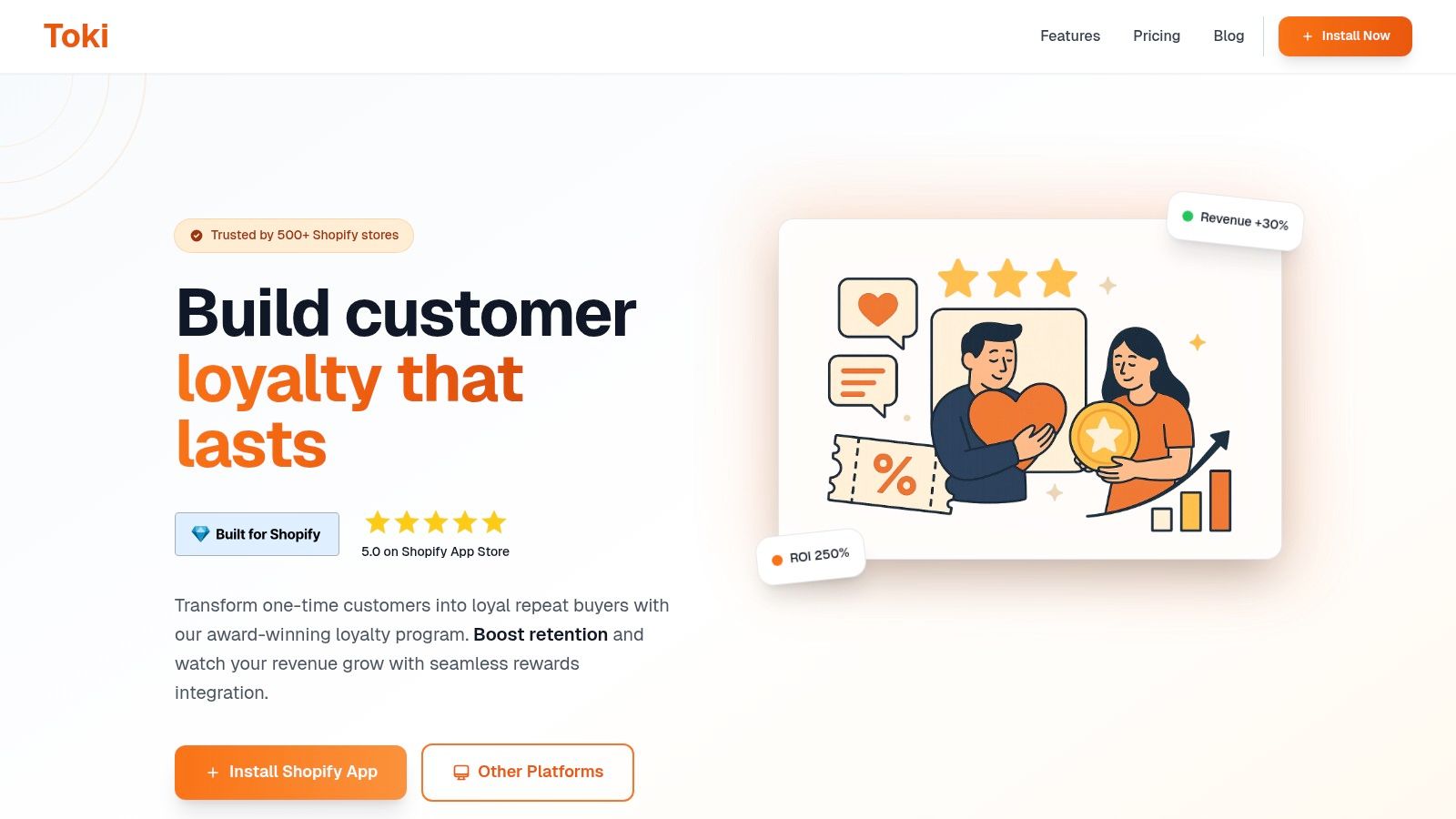
Its strength lies in its ability to turn one-time buyers into active brand advocates. For Shopify and omnichannel retailers, Toki offers a seamless installation process and a scalable model suitable for everyone from emerging startups to established enterprises. The platform is engineered to drive repeat purchases and increase lifetime value without requiring a heavy engineering lift.
Why It's a Top Example for Referral Programs
Toki’s referral system excels because it leverages modern mobile technology and is deeply integrated with other loyalty drivers. The platform’s standout feature is its native integration with Apple and Google Wallets. This allows customers to store their loyalty card, point balance, and unique referral link directly on their phones.
This wallet integration transforms the referral process:
- Instant Access: Customers can access and share their referral link with a single tap from their phone’s wallet, removing the friction of logging into a website.
- Push Notifications: Merchants can send lock-screen notifications directly to the wallet pass, reminding customers about their referral rewards or announcing new campaigns.
- Omnichannel Ready: The digital pass can be scanned at a physical point-of-sale (POS), unifying the online and in-store referral and loyalty experience.
Strategic Insight: By placing the referral link in a native mobile wallet, Toki turns a passive customer into a potential brand ambassador who is always ready to share. This mobile-first approach meets customers where they are and significantly lowers the barrier to sharing.
Key Features and Implementation Tips
Toki provides a robust suite of tools to customize and manage your referral program effectively.
- Incentive Structure: You can set up a classic two-sided incentive model, rewarding both the advocate (for sharing) and the referred friend (for making a purchase). Rewards can be configured as points, percentage discounts, or fixed-amount coupons.
- Gamification: Integrate referrals with challenges and badges. For example, create a "Super Sharer" badge for customers who successfully refer three or more friends, unlocking bonus points or exclusive perks.
- Affiliate Management: Beyond customer referrals, Toki includes affiliate management tools. This allows you to partner with influencers and content creators, providing them with unique links and tracking their performance through a dedicated dashboard.
- Analytics Dashboard: The platform provides clear ROI tracking for your referral program. You can monitor key metrics like referral traffic, conversion rates, and revenue generated from referred customers to optimize your campaigns.
Implementation Tip for Shopify Merchants: When setting up, use Toki's segmentation features to run a targeted referral campaign. For example, create a segment of customers with an AOV (Average Order Value) over $100 and offer them a more valuable referral reward. Announce this exclusive campaign via a wallet push notification to drive immediate engagement.
Pricing and Availability
Toki offers a flexible, tiered pricing model designed to scale with a business's growth, making it an accessible example of a referral program for merchants of all sizes.
| Plan Name | Monthly Price | Orders/Month | Key Features |
|---|---|---|---|
| Starter | Free | Up to 100 | Points, Referrals, Analytics, Wallet Passes |
| Growth | $49 | Up to 500 | Paid Memberships, Community, All Integrations |
| Premium | $299 | Up to 2,000 | Tiered Memberships, Gamification, API Access |
| Plus | $599 | Up to 5,000 | Advanced Segmentation, Dedicated Support |
| Enterprise | Custom | 5,000+ | White-Labeling, Custom Onboarding |
The Free plan is an excellent starting point for new stores to test the core referral and loyalty features. However, high-volume merchants should be mindful of the per-order fees on lower-tiered plans, as moving to a higher tier may be more cost-effective as order volume increases.
With its comprehensive feature set, innovative mobile wallet integration, and scalable pricing, Toki provides a modern, powerful framework for building a referral program that drives both acquisition and long-term loyalty.
Website: https://buildwithtoki.com
2. ReferralCandy
ReferralCandy is a dedicated platform designed to help e-commerce stores launch and manage referral programs efficiently. Instead of being a single program example, it serves as a powerful tool and an extensive library of inspiration, making it a crucial resource for any brand looking to implement word-of-mouth marketing. It simplifies the entire process, from creating compelling offers to automating reward payouts, allowing merchants to focus on growth rather than logistics.
Its primary strength lies in its specialized focus on e-commerce, with seamless integrations for major platforms like Shopify, BigCommerce, and WooCommerce. This makes it one of the most accessible examples of referral programs software for merchants who want a plug-and-play solution that works out of the box. The platform provides a wealth of real-world case studies, offering transparent data on how successful brands structure their incentives and messaging.
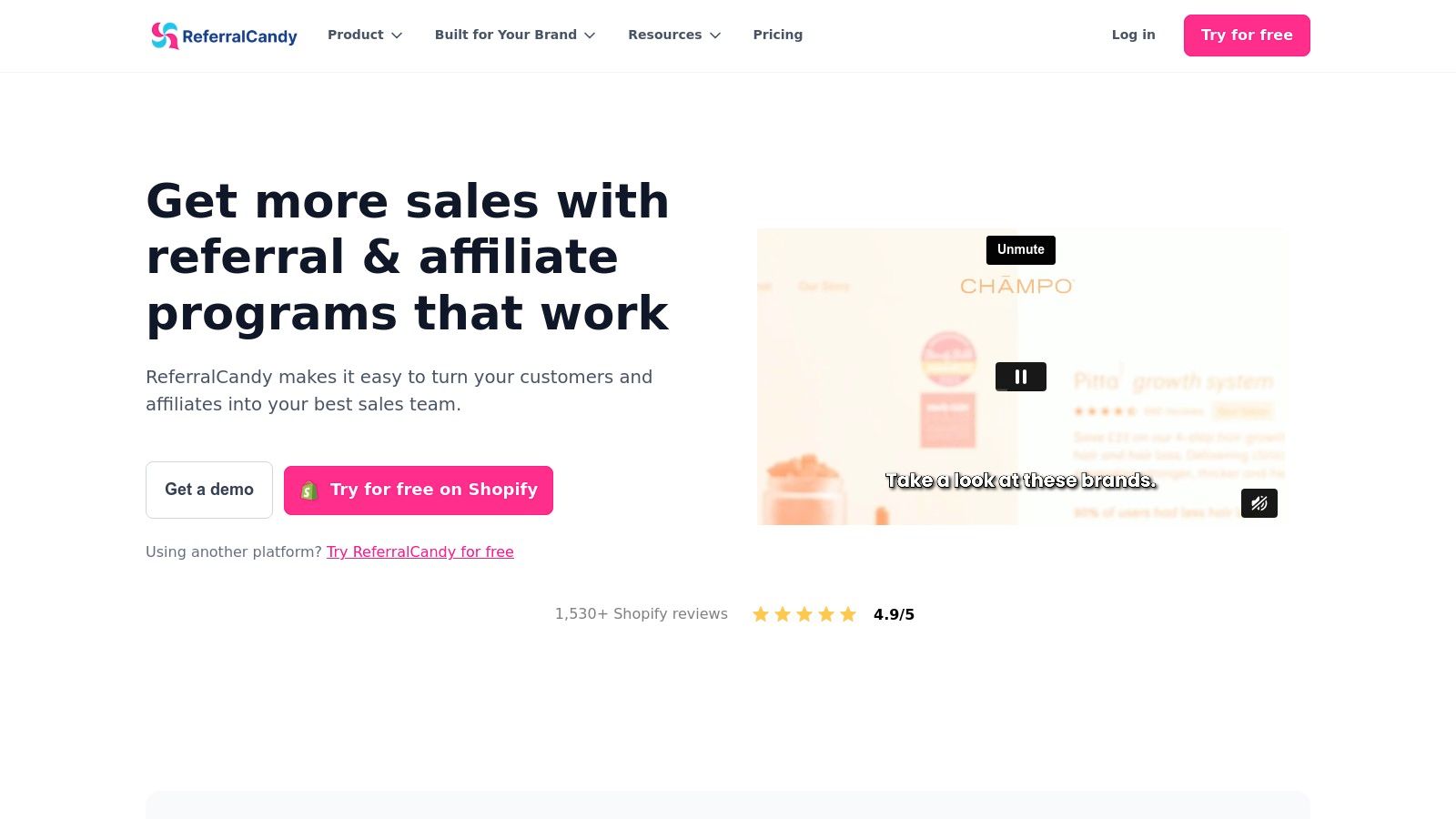
Why It Works & Key Features
ReferralCandy excels because it automates the most time-consuming aspects of running a referral program. It handles tracking clicks, conversions, and reward distribution, which is a significant operational lift for growing brands. The platform is also equipped with robust fraud detection mechanisms to prevent self-referrals and protect your budget.
Key features include:
- Flexible Reward Structures: Merchants can offer cash, store credit, or percentage-based coupons to both the advocate (referrer) and their friend.
- Deep Integrations: It connects with key marketing tools like Klaviyo for email marketing, ReCharge for subscriptions, and many more.
- Post-Purchase Engagement: The platform automatically invites customers to join the referral program immediately after they make a purchase, capitalizing on their peak excitement.
- Customizable Branding: All referral assets, from emails to landing pages, can be customized to match your brand's look and feel, ensuring a consistent user experience.
Pricing and Access
ReferralCandy offers straightforward, transparent pricing, which sets it apart from competitors with complex quote-based models.
| Plan Tier | Monthly Fee | Commission on Referral Sales | Key Features |
|---|---|---|---|
| Premium | Starts at $59/month | 3.5% (first $1,000) | Core referral tools, unlimited advocates, data reports |
| Plus | Starts at $299/month | 1.5% (first $10,000) | Premium features, advanced analytics, dedicated support |
The commission-based fee is a crucial factor to consider. While it ensures ReferralCandy is invested in your success, brands with lower margins should calculate its impact on profitability. You can learn more about ReferralCandy's strategic implementation to see if this model fits your business.
Practical Tips for Implementation
- Model Success: Don't start from scratch. Dive into ReferralCandy's public case studies to find a brand similar to yours and model your initial offer structure on their proven success.
- Promote Everywhere: Embed your referral link in post-purchase emails, your website footer, and customer account pages to maximize visibility and enrollment.
- Use the Shopify Integration: If you're on Shopify, use the dedicated app for the fastest setup. It automatically connects with your order system for seamless reward fulfillment.
Pros:
- Extremely fast and easy setup, especially for Shopify stores.
- Proven track record with thousands of e-commerce brands.
- Rich library of case studies for campaign ideas.
Cons:
- The success fee on referral sales can be a drawback for low-margin businesses.
- Advanced features like tiered rewards are part of an add-on (Boost), which costs extra.
Website: https://www.referralcandy.com
3. Referral Rock
Referral Rock is a highly versatile referral marketing platform that extends beyond traditional e-commerce, catering to service-based businesses, SaaS companies, and B2B enterprises. Its key differentiator is its ability to track the entire referral lifecycle, from initial lead to final sale, making it ideal for businesses with longer sales cycles or those that need to reward advocates for actions other than immediate purchases. This flexibility allows companies to build more complex, multi-stage referral programs.
The platform is designed for businesses that require more than a simple post-purchase coupon system. It provides a dedicated, hosted member portal where advocates can track their referrals' progress, access promotional materials, and see their rewards. This level of transparency is a powerful motivator for advocates and makes Referral Rock one of the more robust examples of referral programs for non-Shopify use cases or where lead generation is the primary goal.
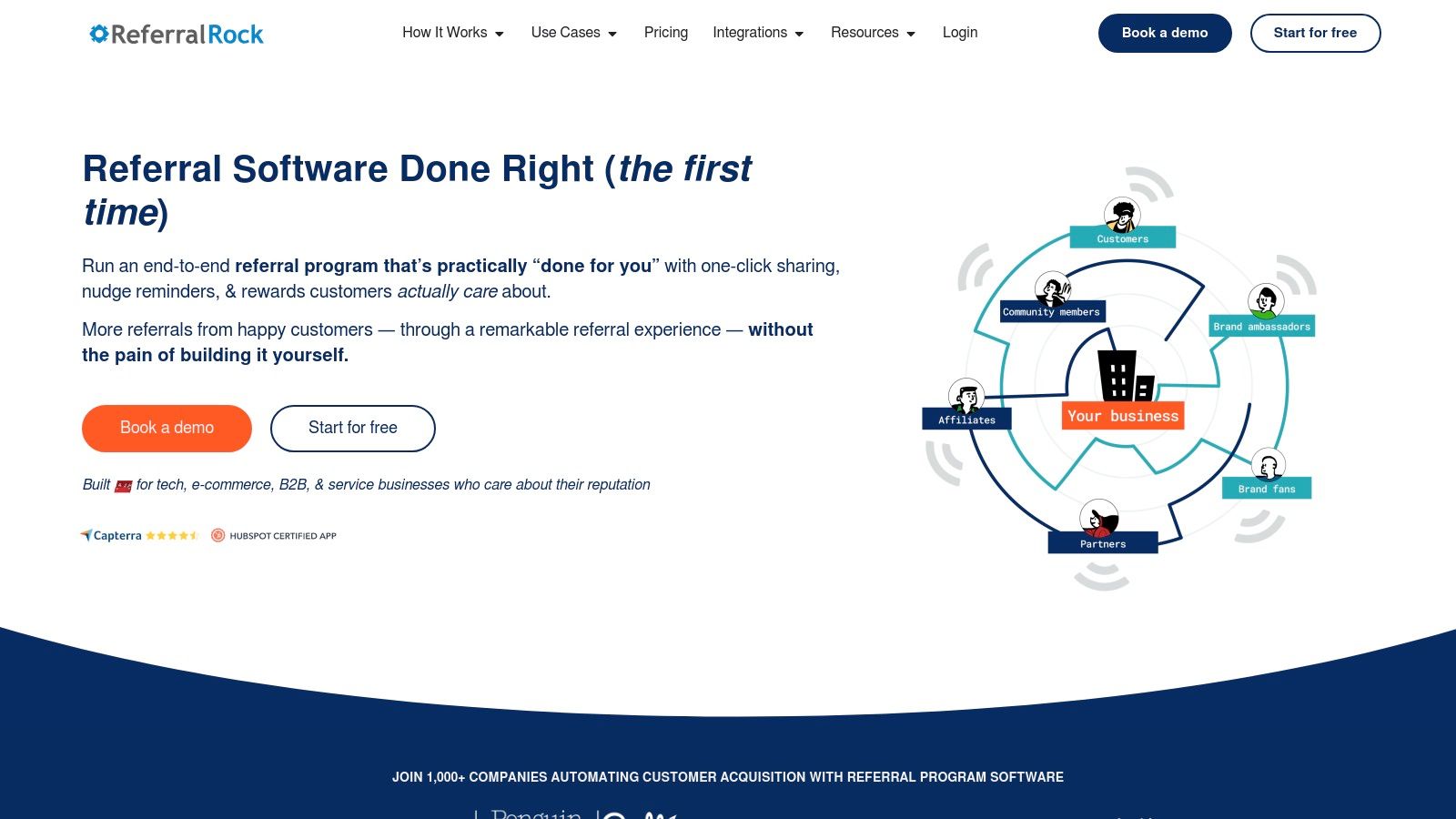
Why It Works & Key Features
Referral Rock succeeds by offering deep customization and control over the referral process. Businesses can set up specific rules and triggers, rewarding advocates when a referred lead signs up for a demo, subscribes to a newsletter, or completes a purchase. This adaptability makes it suitable for virtually any business model, not just direct-to-consumer e-commerce. The concierge onboarding service also helps new users get their complex programs up and running quickly.
Key features include:
- Hosted Member Portal: A dedicated, brandable space for advocates to manage their referrals and track rewards in real-time.
- Lifecycle Tracking: Monitors referrals from the initial share to the final conversion, providing visibility for both the business and the advocate.
- Configurable Reward Rules: Ability to issue rewards for qualified leads, completed sales, or other custom events, not just e-commerce transactions.
- Native CRM Integrations: Connects directly with platforms like HubSpot and Salesforce (as add-ons) to seamlessly integrate referral data into your sales pipeline.
Pricing and Access
Referral Rock offers clear, upfront pricing with defined limits, which is helpful for budgeting. However, businesses should be mindful of potential overage fees and add-on costs for advanced integrations.
| Plan Tier | Monthly Fee | Included Members | Key Features |
|---|---|---|---|
| Starter | Starts at $200/month | 500 | Core referral program builder, email support |
| Growth | Starts at $400/month | 5,000 | Multiple campaigns, gift card rewards, API access |
| Established | Starts at $800/month | 10,000 | Advanced integrations, dedicated success manager |
The model is well-suited for businesses that can justify the monthly fee with high-value conversions, like B2B services or high-ticket e-commerce. You can explore more Referral Rock implementation details and see how it compares to other examples of referral programs to determine if it fits your budget and needs.
Practical Tips for Implementation
- Map Your Customer Journey: Before building, clearly define the key conversion points in your sales cycle. Decide if you want to reward for leads, sales, or both.
- Leverage the Member Portal: Actively encourage your advocates to use their portal. Promote it as their central hub for sharing and tracking to keep them engaged.
- Use CRM Integrations: If you run a B2B or service business, connect Referral Rock to your CRM from day one. This ensures your sales team can follow up on referred leads effectively and that rewards are triggered correctly.
Pros:
- Highly versatile; works for e-commerce, B2B, and service-based businesses.
- Transparent, upfront pricing with clear plan limits.
- Excellent for programs where the conversion event is not an immediate online purchase.
Cons:
- Can become expensive with overage fees for high referral volume.
- Essential CRM integrations like Salesforce and HubSpot are paid add-ons.
Website: https://referralrock.com
4. Friendbuy
Friendbuy is an enterprise-grade referral and loyalty platform favored by many direct-to-consumer (DTC) and subscription-based brands. It positions itself as more than just a software tool; it's a growth marketing platform built on a deep library of best practices and case studies from industry leaders. This makes it an invaluable resource for businesses looking to model their strategy on proven success.
The platform's core strength is its ability to handle complex reward logic, particularly for subscription services and brands with large product catalogs. It allows for sophisticated incentive structures that go beyond simple discounts, making it one of the more powerful examples of referral programs software for scaling companies. Its extensive gallery of real-world campaigns provides a clear blueprint for merchants aiming to build a high-performing program.
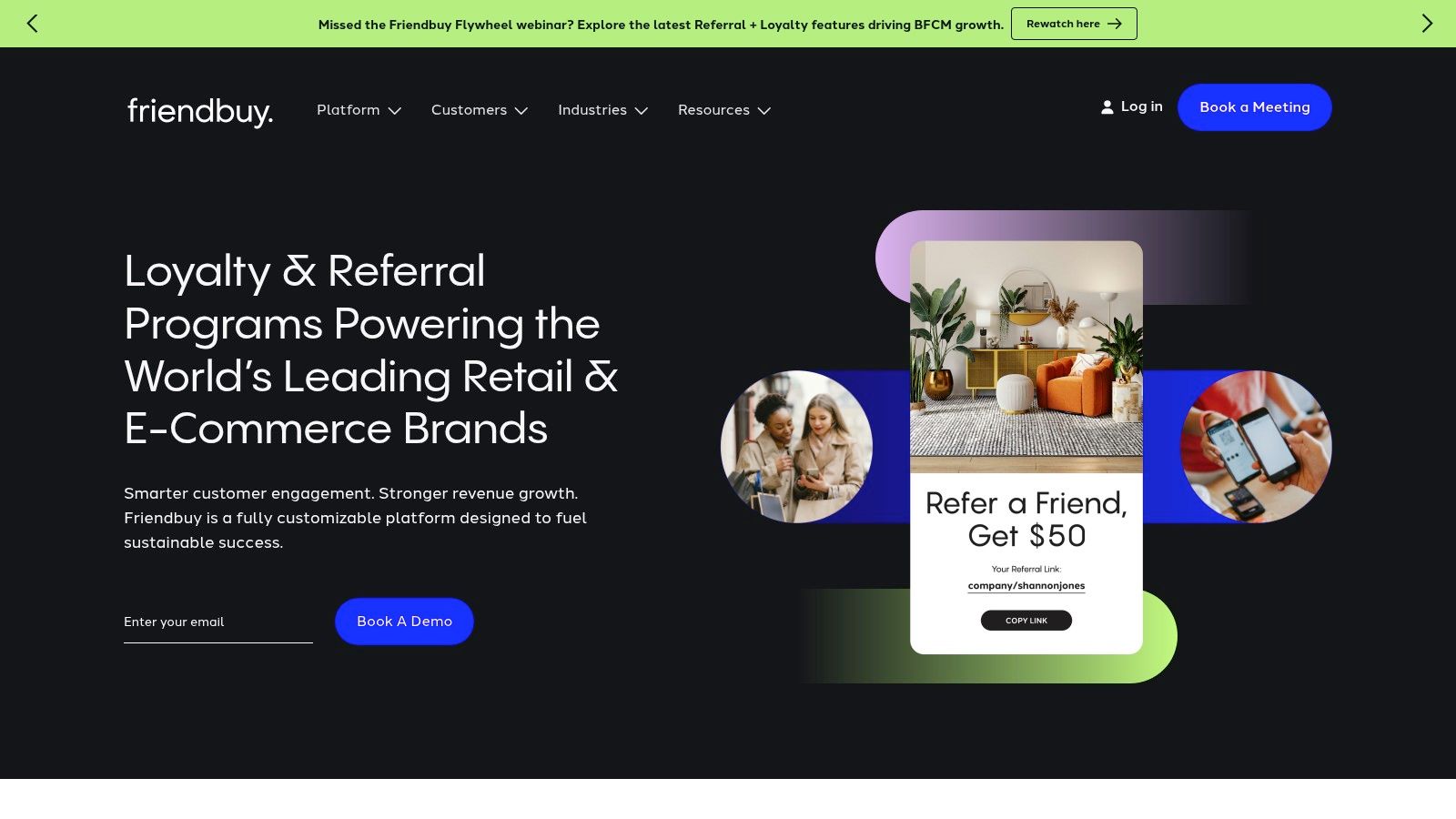
Why It Works & Key Features
Friendbuy excels by empowering brands to create highly tailored and sophisticated referral programs that align with complex business models. The platform's robust infrastructure supports automated reward fulfillment, fraud detection, and the kind of nuanced rule-setting that enterprise-level businesses require to maximize ROI and prevent abuse.
Key features include:
- Advanced Reward Logic: Supports tiered rewards, event-based triggers, and SKU-specific incentives, allowing brands to offer specific products or services as rewards.
- Subscription Integrations: Seamlessly connects with subscription billing platforms like ReCharge and Stripe, making it ideal for recurring revenue businesses.
- A/B Testing: Built-in tools allow marketers to test different offers, copy, and creative to optimize program performance systematically.
- Rich Case Study Library: Offers extensive best-practice examples and detailed case studies from well-known brands like Casper, Away, and Dollar Shave Club.
Pricing and Access
Friendbuy's pricing is not publicly listed and operates on a quote-based model, which is typical for enterprise-focused SaaS platforms. This approach allows them to tailor a package and price point based on a company's specific needs, referral volume, and technical requirements.
| Plan Tier | Monthly Fee | Commission on Referral Sales | Key Features |
|---|---|---|---|
| Custom | Quote-based | Varies by plan | Full access to referral & loyalty tools, dedicated account manager, advanced integrations, A/B testing |
Prospective customers must contact their sales team to get a personalized quote. This model is best suited for established brands with a dedicated marketing budget that require a high degree of customization and hands-on support.
Practical Tips for Implementation
- Leverage Their Case Studies: Before building your program, thoroughly review Friendbuy's case studies. Identify a brand with a similar customer base or business model and use their program structure as your starting point.
- Test SKU-Based Rewards: If you have a hero product, test an offer where advocates can earn that specific item for free. This can be a more powerful motivator than a simple cash discount.
- Integrate with Your Tech Stack: Take full advantage of their deep integrations with tools like Klaviyo, Attentive, and ReCharge to create a seamless experience where referral messaging and rewards are embedded across your marketing channels.
Pros:
- Excellent for subscription businesses and brands needing complex reward scenarios.
- Abundant real-brand examples provide a clear roadmap for program design.
- Powerful A/B testing and analytics capabilities.
Cons:
- Pricing is sales-led and not transparent, which can be a barrier for smaller businesses.
- Its enterprise focus means it may be more complex than what a very small store needs.
Website: https://www.friendbuy.com
5. Talkable
Talkable is a referral marketing platform tailored for mid-market and enterprise e-commerce brands that require a more hands-on, strategic approach. Unlike purely self-service tools, Talkable positions itself as a growth partner, offering managed services, dedicated success teams, and strategy guidance to ensure referral programs are optimized for maximum revenue impact. This makes it an ideal choice for larger brands that need expert execution and don't have the in-house bandwidth to manage program nuances.
Its core strength lies in its performance-focused, full-service model. Talkable provides extensive, documented case studies that transparently quantify the ROI and revenue lift from their programs, giving prospective clients clear benchmarks. This emphasis on data-driven strategy and managed implementation makes it one of the most compelling examples of referral programs for businesses seeking a high-touch partnership rather than just a software license.
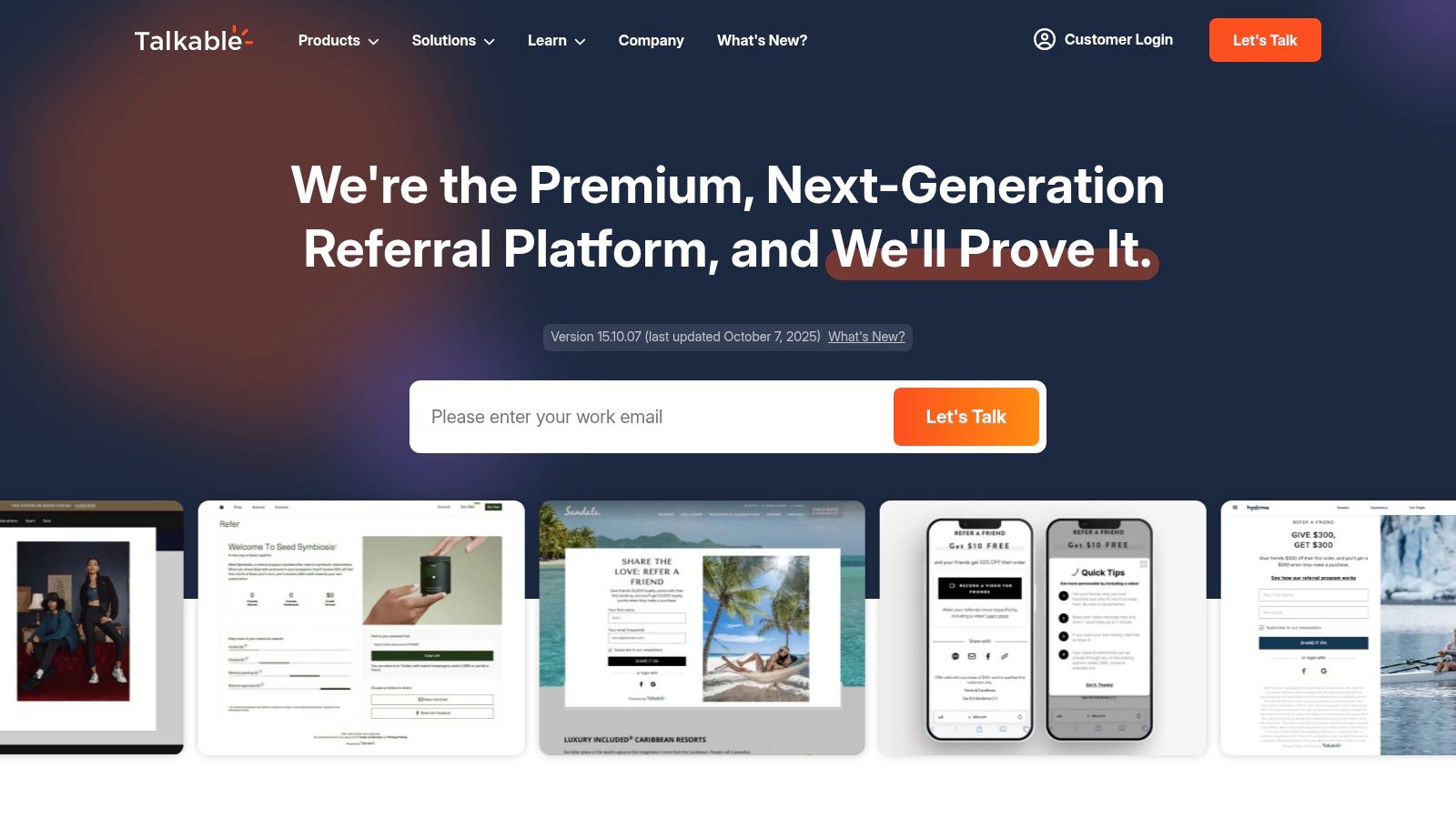
Why It Works & Key Features
Talkable excels by combining powerful software with dedicated human expertise. Their managed launches and ongoing optimization mean that brands get a program designed and fine-tuned by specialists who understand conversion rate optimization and customer psychology. This is particularly valuable for complex businesses with multiple customer segments or international markets.
Key features include:
- Dedicated Success Teams: Clients receive hands-on support from a dedicated team that helps with strategy, A/B testing, and ongoing campaign management.
- Managed Launches: The Talkable team handles the initial program setup and launch, ensuring best practices are implemented from day one for a smooth rollout.
- Performance Optimization: The platform is built for continuous improvement, with robust A/B testing capabilities to refine offers, messaging, and campaign placements.
- Quantified Impact: Talkable focuses on delivering measurable results, with case studies across various verticals demonstrating clear revenue and growth metrics.
Pricing and Access
Talkable uses a quote-based pricing model with flat monthly fees, which distinguishes it from platforms that charge a percentage of referral sales. This predictable pricing is better for brands with high sales volume. However, access requires a commitment.
| Plan Tier | Monthly Fee | Contract Term | Key Features |
|---|---|---|---|
| Quote-Based | Varies by need | 12-month minimum | Full platform access, dedicated support, managed services |
An important consideration is that all plans require a 12-month agreement and include an implementation fee equivalent to one month's subscription cost. The pricing is gated behind a sales call, as plans are customized to each brand's specific goals and scale.
Practical Tips for Implementation
- Leverage Their Expertise: If you choose Talkable, lean heavily on their success team. Come prepared with your customer data and business goals to co-create a highly targeted strategy.
- Review Case Studies: Before your initial call, study their case studies for brands in your industry. This will help you understand their approach and ask more informed questions.
- Prepare for a Partnership: View the engagement as a strategic partnership, not just a software subscription. Allocate internal resources to collaborate with the Talkable team for the best results.
Pros:
- Flat monthly pricing model is predictable and doesn't cut into referral revenue margins.
- Hands-on support and strategy are excellent for teams that need expert guidance.
- Proven track record with enterprise-level brands and quantifiable results.
Cons:
- Requires a 12-month contract and an upfront implementation fee, making it a significant commitment.
- Pricing is not transparent and requires engaging with their sales team.
Website: https://www.talkable.com
6. Viral Loops
Viral Loops is a campaign-driven referral marketing platform that specializes in making viral mechanics accessible to everyone. It stands out by offering pre-built templates for various types of viral campaigns, such as milestone referrals, leaderboard contests, and pre-launch waiting lists. This template-based approach allows startups and marketers to quickly test different growth loops without needing to write any code.
Its primary strength is its versatility, catering not just to e-commerce stores but also to lead generation, product launches, and audience building. By providing structured, proven campaign formats, Viral Loops demystifies the process of creating viral engagement. This makes it one of the most agile examples of referral programs for businesses that want to experiment with multiple growth strategies, from rewarding users for sharing to creating competitive giveaways. Understanding the mechanisms behind viral spread can significantly enhance your referral program's design. You can explore effective strategies for creating viral content to further amplify your reach.
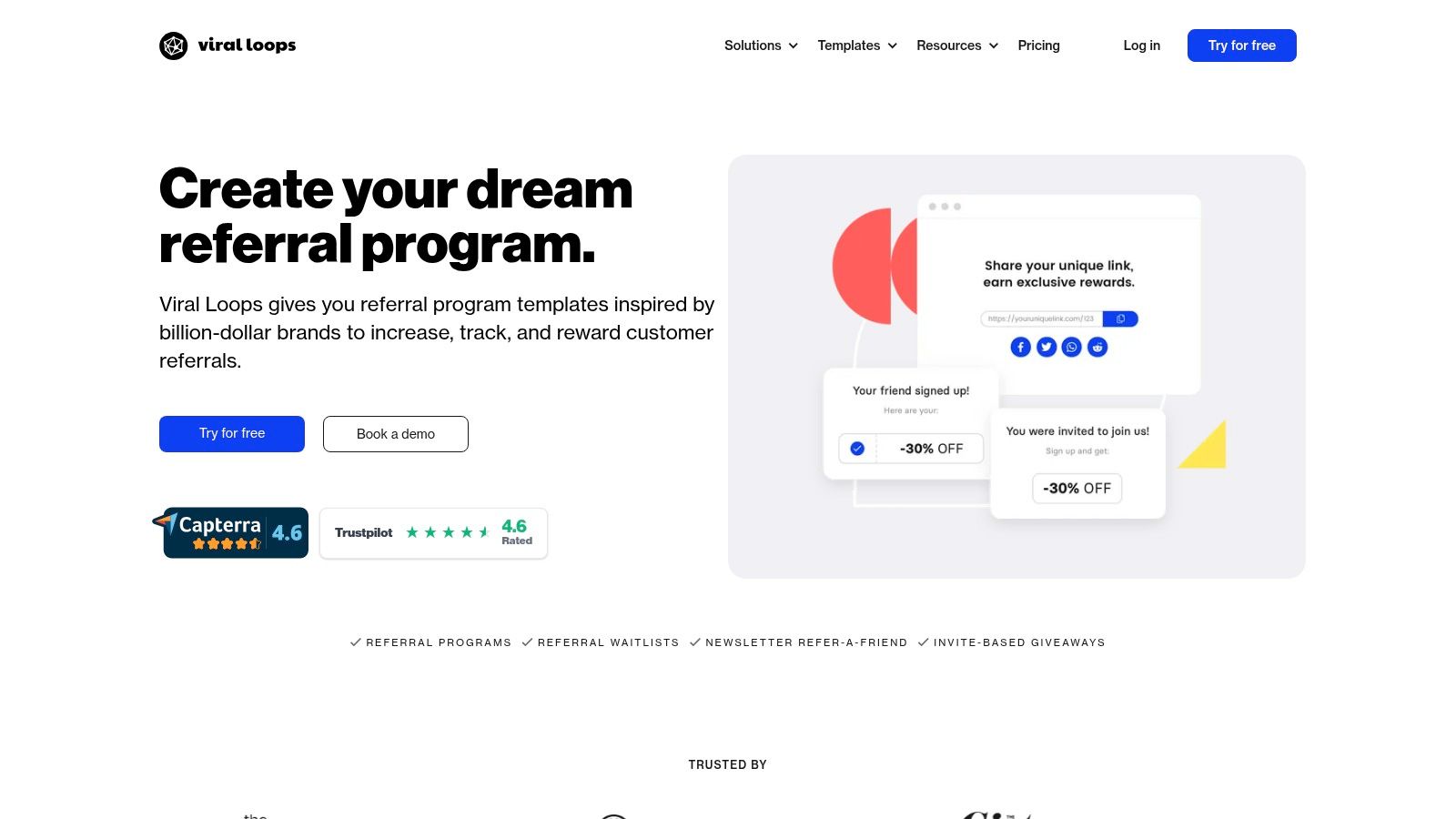
Why It Works & Key Features
Viral Loops works because it lowers the barrier to entry for sophisticated viral marketing tactics. The platform guides users through setting up campaigns based on proven psychological triggers like competition (leaderboards) and goal-setting (milestones). This structure helps brands create engaging experiences that motivate users to share consistently.
Key features include:
- Pre-Built Campaign Templates: Choose from a library of ready-to-launch campaigns, including milestone referrals, viral sweepstakes, and pre-launch campaigns.
- No-Code Campaign Builder: Customize widgets, landing pages, and emails with a user-friendly editor, no development skills required.
- Broad Integrations: Connects with tools like HubSpot, Mailchimp, and Zapier, along with reward fulfillment services like Stripe and Tremendous.
- Flexible Application: Suitable for e-commerce sales, B2B lead generation, and building a waitlist for a new product.
Pricing and Access
Viral Loops uses a transparent, participant-based pricing model. Tiers are defined by the number of participants you can have in your campaigns each month, making it easy to predict costs as you scale.
| Plan Tier | Monthly Fee | Monthly Participants | Key Features |
|---|---|---|---|
| Start-Up | Starts at $49/month | Up to 1,000 | All templates, integrations, email support |
| Growing | Starts at $99/month | Up to 5,000 | No Viral Loops branding, live chat support |
| Power | Starts at $299/month | Up to 25,000 | Advanced integrations, dedicated support |
The participant cap is a key factor. As your campaign grows, you'll need to upgrade, so it's important to factor this into your customer acquisition cost calculations.
Practical Tips for Implementation
- Choose the Right Template: Match the campaign type to your goal. Use a "Milestone Referral" for e-commerce rewards, a "Pre-launch" for a new product, or a "Leaderboard Giveaway" to generate buzz.
- Test Your Incentives: The platform makes it easy to duplicate campaigns. Run A/B tests with different reward structures to see what motivates your specific audience to share the most.
- Use the HubSpot Integration: If you are a B2B or service-based business, leverage the HubSpot integration to automatically feed new leads from your referral campaign directly into your CRM workflows.
Pros:
- Template-driven approach makes launching campaigns extremely fast.
- Versatile enough for both e-commerce and lead generation.
- Clear, participant-based pricing is easy to understand.
Cons:
- Participant caps on lower-tier plans can be restrictive for fast-growing campaigns.
- Removing Viral Loops branding requires upgrading to the "Growing" plan.
Website: https://viral-loops.com
7. Shopify App Store – Referral Apps Collection
The Shopify App Store’s dedicated Referral Apps Collection is less a single program and more of a strategic starting point for merchants. It serves as a curated marketplace where store owners can discover, compare, and install a wide range of referral and affiliate marketing applications. This centralized hub is an invaluable resource for finding examples of referral programs in action, as each app listing includes reviews, screenshots, and case studies from real-world merchants.
This collection empowers Shopify users to move from research to implementation with minimal friction. Instead of searching the web for disparate solutions, merchants can compare top-rated apps like ReferralCandy, Rivo, and UpPromote side-by-side. The user-generated reviews and ratings provide social proof and insights into an app's ease of use, customer support quality, and overall effectiveness, helping brands make an informed decision based on their specific needs and budget.
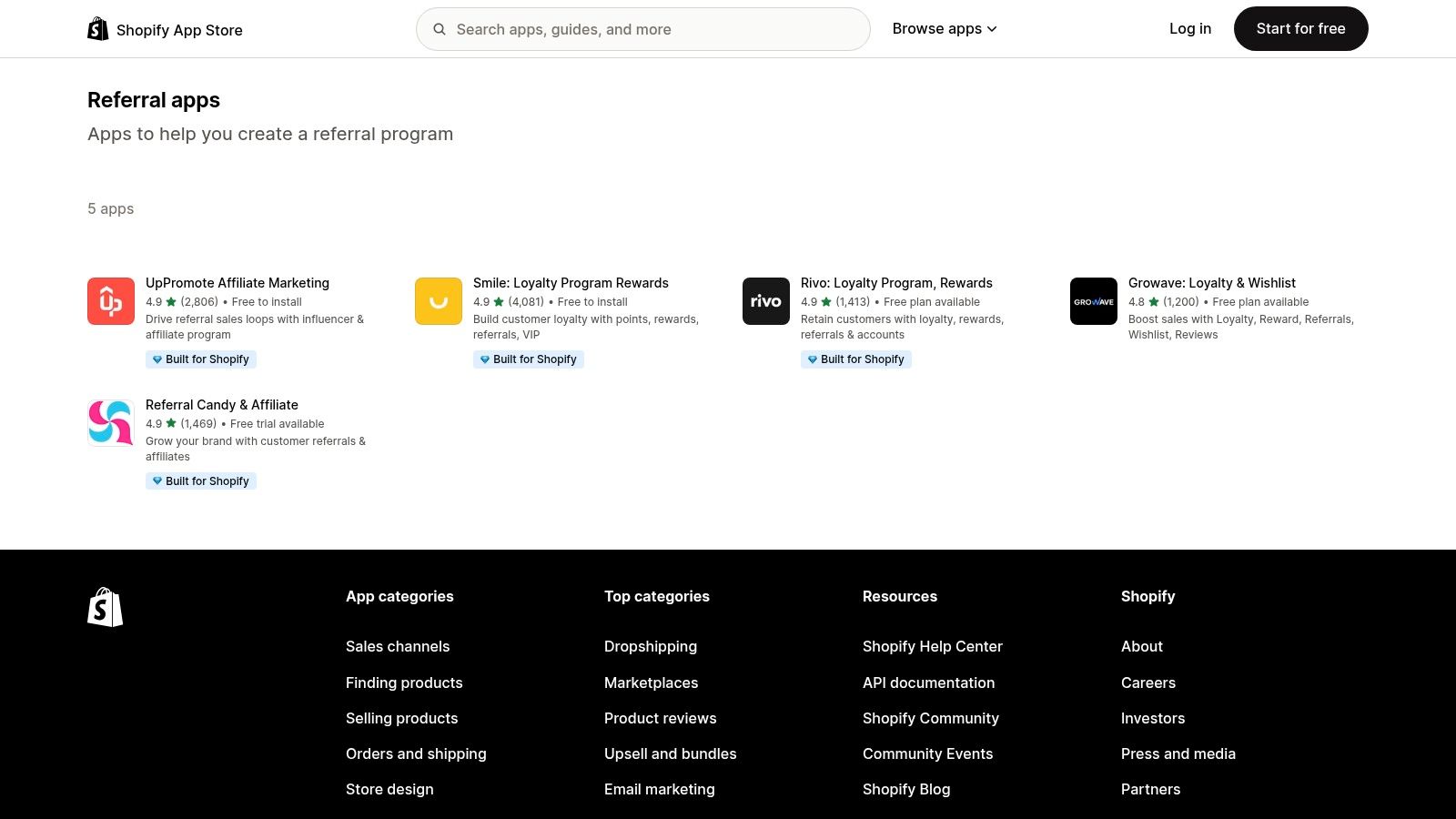
Why It Works & Key Features
The power of the Shopify App Store lies in its integration and transparency. It simplifies the discovery process by filtering for apps that are guaranteed to be compatible with the Shopify ecosystem. This direct pipeline from browsing to installing eliminates technical barriers, allowing merchants to launch a program in hours, not weeks. The competitive nature of the marketplace also drives app developers to offer compelling features and flexible pricing.
Key features include:
- Centralized Discovery: Provides a single destination to find and evaluate dozens of referral marketing apps with verified merchant reviews and ratings.
- Direct Installation: Apps can be installed directly into a Shopify store with just a few clicks, ensuring seamless integration with customer and order data.
- Transparent Information: Each app page details its features, pricing tiers, and provides screenshots of its interface and customer-facing elements.
- Free Plans & Trials: Many apps listed in the collection offer free plans or trial periods, allowing merchants to test their functionality before committing financially.
Pricing and Access
Pricing is not standardized across the collection; it is determined by each individual app developer. This results in a wide spectrum of models, from free-to-install apps with basic features to premium enterprise-level solutions with monthly subscription fees.
| Pricing Model | Common Examples | Best For |
|---|---|---|
| Free Plan | Rivo, Growave | New stores or businesses testing referral marketing. |
| Flat Monthly Fee | UpPromote, Smile.io | Businesses seeking predictable costs. |
| Commission-Based | ReferralCandy | Brands that want to pay based on performance. |
| Tiered Subscription | Most Apps | Scaling businesses needing more features as they grow. |
Merchants must carefully evaluate each app's pricing structure, including any commission fees or limitations on the number of advocates or referral orders. This is a critical step in ensuring the chosen program remains profitable.
Practical Tips for Implementation
- Leverage User Reviews: Pay close attention to recent reviews from merchants in a similar industry or with a similar order volume to gauge an app's real-world performance.
- Start with a Free Trial: Before committing to a paid plan, install an app with a free trial to test its user interface, setup process, and customer support.
- Check for Key Integrations: Ensure the app you choose integrates with your existing marketing stack, such as your email service provider (e.g., Klaviyo) or loyalty platform. You can discover more about Shopify referral marketing strategies to align your choice with your goals.
Pros:
- One-stop shop for comparing multiple vetted referral solutions.
- Merchant reviews provide invaluable, unbiased feedback.
- Quick and easy installation for any Shopify store.
Cons:
- Only relevant for businesses using the Shopify platform.
- The sheer number of options can be overwhelming for beginners.
- Pricing and feature sets vary widely, requiring careful research.
Website: https://apps.shopify.com/collections/referral-apps
Top 7 Referral Program Platforms Comparison
| Solution | 🔄 Implementation complexity | ⚡ Resource & cost | ⭐ / 📊 Expected outcomes | Ideal use cases | 💡 Key advantages |
|---|---|---|---|---|---|
| Toki | Low — fast Shopify install, turnkey omnichannel setup | Tiered pricing (Free → $599+/custom); note per‑order fees on lower plans | ⭐ High — reported retention lift up to ~40% and strong ROI | Shopify merchants to enterprise needing unified loyalty + referrals | All‑in‑one stack, Apple/Google Wallet, gamification, analytics, 24/7 support |
| ReferralCandy | Low — quick Shopify setup; template‑driven | Subscription + success fee on referral sales; Boost add‑on for affiliates | ⭐ Moderate‑High — proven referral ROI in case studies | Ecommerce brands focused on referral campaigns | Rich case studies, multiple reward types, fast launch |
| Referral Rock | Medium — configurable rules, hosted portals, CRM setup | Up‑front pricing with add‑ons; extra cost for CRM integrations and overages | ⭐ Moderate — strong for lead→sale tracking and lifecycle programs | B2B, services, and teams needing hosted referral portals | Hosted member portal, lifecycle tracking, CRM integrations |
| Friendbuy | Medium‑High — enterprise integration and complex reward logic | Sales‑led/quote pricing; suited to larger budgets | ⭐ High — effective for subscriptions and SKU‑based incentives | Subscription businesses and enterprise DTC brands | Sophisticated reward logic, SKU rules, extensive brand examples |
| Talkable | Medium — managed services with dedicated teams | Flat monthly pricing but requires 12‑month agreement + implementation fee | ⭐ High — hands‑on launches and conversion optimization | Mid‑market & enterprise needing strategy + execution support | Dedicated success teams, managed launches, performance focus |
| Viral Loops | Low — no‑code templates and prebuilt viral mechanics | Participant‑based pricing with caps on lower tiers | ⭐ Variable — high potential for viral lift when campaigns resonate | Startups and marketers testing viral/prelaunch/giveaway campaigns | Prebuilt templates, rapid testing, self‑serve setup |
| Shopify App Store – Referral Apps Collection | Low — centralized discovery and direct install to stores | Varies by app; many apps offer free plans or trials | ⭐ Variable — outcomes depend on chosen app and implementation | Shopify merchants researching and comparing referral solutions | One‑stop comparison (ratings, screenshots), quick install path |
From Examples to Execution: Building Your High-Impact Referral Program
Throughout this deep dive into the best examples of referral programs, we've explored a diverse landscape of strategies and tools. From the seamless, mobile-first experience offered by Toki to the campaign-specific power of Viral Loops and the enterprise-level sophistication of Friendbuy, a clear pattern emerges. The most successful programs are not just about offering a discount; they are about understanding customer psychology, removing friction, and aligning incentives with brand values.
We’ve seen how brands leverage two-sided incentives to motivate both the referrer and the new customer, how tiered rewards can gamify the experience, and how clear, on-brand messaging is crucial for driving participation. The key isn't to copy one of these examples verbatim, but to synthesize the underlying principles and adapt them to your unique audience and business goals. Your customers are your most authentic and powerful marketing channel, and a well-designed referral program is the key to unlocking that potential.
Synthesizing the Key Takeaways
Distilling our analysis of these powerful tools and strategies, several core principles stand out as universally applicable for any e-commerce merchant looking to build a high-impact referral program.
- Make it Effortless: The single biggest barrier to a successful referral is friction. Programs that integrate seamlessly into the customer journey, like Toki's mobile wallet pass or ReferralCandy's automated payouts, see significantly higher engagement. Your goal should be to make sharing as easy as a single tap.
- Incentives Must Align: The value of your reward must match the effort required and the value of a new customer. Whether it's store credit, cash, or exclusive perks, the incentive has to be genuinely compelling to both the advocate and their friend. A/B testing different offers is not just recommended; it's essential.
- Clarity is King: Your program’s rules, rewards, and sharing process must be crystal clear. Use simple language, visual cues, and a dedicated landing page to explain exactly how it works. Confusion is the enemy of conversion.
- Promote, Promote, Promote: A referral program is not a "set it and forget it" tool. Promote it relentlessly across your marketing channels: post-purchase emails, newsletters, social media, and even on your packaging. As seen with tools like Talkable, integrating promotion into key customer touchpoints is critical for visibility and success.
Your Action Plan: Choosing the Right Path Forward
With these principles in mind, it's time to move from analysis to action. Follow this framework to build your own program.
- Define Your Primary Goal: What is the number one objective? Is it pure customer acquisition, increasing customer lifetime value (LTV), or boosting brand awareness? Your goal will dictate your incentive structure and the key metrics you track.
- Understand Your Customer's Motivation: Why would your customers refer you? Are they motivated by financial rewards (cash, deep discounts) or social currency (exclusive access, tiered status)? Survey your best customers to get direct feedback.
- Select the Right Tool for the Job: Your technology choice is foundational.
- For Shopify merchants seeking a simple, automated solution, ReferralCandy is a strong starting point.
- If you need deep customization and A/B testing capabilities, look towards Talkable or Friendbuy.
- For brands focused on a mobile-first, frictionless experience, Toki’s digital pass system is uniquely powerful.
- If your strategy involves campaign-based viral contests or giveaways, Viral Loops is designed for that specific purpose.
- Launch, Measure, and Iterate: Your initial launch is just the beginning. Closely monitor your key metrics like participation rate, share rate, and conversion rate. Use this data to refine your offer, messaging, and promotional tactics over time.
For brands looking to take customer advocacy a step further, a referral program can be a perfect gateway to a more structured brand ambassador program. By identifying your top referrers, you can invite them into an exclusive community, empowering them with the tools and incentives to become true, long-term partners for your brand. This creates a powerful, tiered system of advocacy that drives sustainable growth.
Ready to turn your best customers into your most effective growth engine? The examples of referral programs we've covered show what's possible with the right strategy and tools. Toki is designed to eliminate the friction that holds most programs back, creating a seamless, mobile-native experience that customers love to use. Learn how Toki can help you launch a referral program that drives real results.